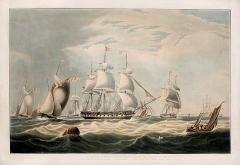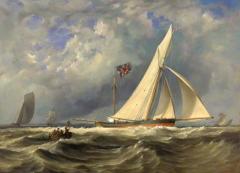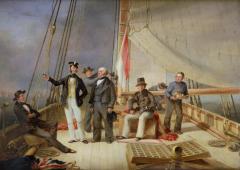In the course of my studies I happened upon this account of a weekend regatta in Cherbourg in 1831, which illustrates the beginnings of the warm friendships between English and French yachting folk, after centuries of national disagreements, which have since been expressed far more creatively in the keenest competition in yacht racing.
In line with the pro-English policies of the liberal Bourbon monarch Louis-Philippe I, who became king in 1830, English visitors were welcomed in France, and in 1831 Cherbourg, which had seen the ignominious exit of the outgoing king Charles X the year before, was a popular destination for leisure sailors. As the report of the United Services Magazine puts it:
'Many of the Royal Yacht Club yachts, induced by the government of France having liberally made their vessels free of the French ports, had been in the habit of visiting Cherbourg in the summer, and there supplying themselves with wine'.
No great surprise there, though the report continues: 'This naturally led to an increasing intercourse between the yachters and Cherbourgians, and the latter readily adopted the suggestion of M. le Magnen, a spirited individual of the place, to celebrate the annual visit of their English friends by a regatta'.
Two cups were put up by subscribers; the first, worth 100 guineas was for cutters, the second, at a mere 50 guineas, would be raced for by schooners, and on August 25th 'between twenty and thirty sail of yachts' assembled at Spithead for the rally across the Channel in very light winds. Included were 'the Commodore's noble ship, Falcon, in all the perfection of a British man-of-war; Lord Vernon's handsome brig; the rakeish schooners of Capt. Wyndham, Mr. Brett and Mr. Williams, and the tremendous cutters of Lord Belfast and Mr Weld. Then came the long line of powerful seventies, fast fifties, and smart forty-fives'.
This gives an idea of the size of yachts involved; the Mr. Weld mentioned is Joseph Weld of Lulworth Castle, a leading pioneer of yacht racing in England who had launched his most famous cutter, 'Alarm' only the year before. 'Alarm' immediately won the King's Cup, though in 1831 had lost to Lord Belfast's 'Louisa' in a match race with a one thousand guinea prize! 'Alarm' measured 61ft. 9in. and displaced 84 tons in her original form.
The main race of the Cherbourg regatta involved three circuits of the new breakwater, still being worked on; leaving aside questions of local wind and tide, it is perhaps no surprise that our reporter voices the kind of comments about handicapping which would become a constant litany in the century and more to come:
'It is to be regretted that the arrangements of this race had not been more carefully studied, for it was soon evident that the time which had been allowed between the starting of each class of yachts, was by no means equal to their difference in tonnage, and the consequence was, that the smaller vessels, having too great a start for the larger class, maintained their place ahead, and before Lord Belfast's 'Louise' had little more than completed one round of the course, the race was won by the 'Eliza' of Capt. Garth, a little cutter of thirty-five tons.'
Racing at that time probably involved considerable attention to pecking order, though any disagreement would have vanished at the magnificent ball held in 'a room of considerable dimensions in the Royal Arsenal', whose walls 'were divided by pilasters, formed of evergreens and flowers, into compartments, which contained, in letters of gold, the names of British worthies, encircled with chaplets of laurel. Among these the names of Byron, Scott, and Canning were conspicuous.'
The beginnings of 'entente cordiale' were clearly being consciously developed by these enthusiastic yachtsmen from 'the two great rival but now friendly nations', and the next day the jollity continued as 'the sun shone bright upon the hundreds of rich and various-coloured flags of the yachts as they danced in the roadstead in holiday attire'. Racing for the cup for schooners took place in the afternoon, and in the evening there was a concert and ball given by the Rear-Admiral commanding the port, Baron le Marant, at which ''L'Angleterre et La France' and 'La France et L'Angleterre' were joyfully toasted at the public tables, and all seemed desirous to please and be pleased'.
This entertainment was 'only equalled in brilliancy by Lord Yarborough's ball on board the 'Falcon' the following evening, which terminated the festivities; for the Weymouth Regatta had been fixed for the 31st, and the morning's dawn showed the fleet under all sail for Portland'. Those were the days, it appears, but our own annual festive event in Cherbourg is now less than four months away!
Cut and paste the link below to find out more - including what happened to the unsuspecting French spectator who got picked up by the bowsprit of one of the competitors!
Steve Fraser
Submitted on 2nd March 2015



